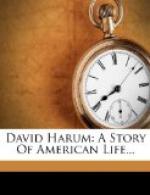So the piano came, and was a great comfort and resource. Indeed, before long it became the regular order of things for David and his sister to spend an hour or so on Sunday evenings listening to his music and their own as well—that is, the music of their choice—which latter was mostly to be found in “Carmina Sacra” and “Moody and Sankey”; and Aunt Polly’s heart was glad indeed when she and John together made concord of sweet sounds in some familiar hymn tune, to the great edification of Mr. Harum, whose admiration was unbounded.
* * * * *
“Did I tell you,” said David to Dick Larrabee, “what happened the last time me an’ John went ridin’ together?”
“Not’s I remember on,” replied Dick.
“Wa’al, we’ve rode together quite a consid’able,” said Mr. Harum, “but I hadn’t never said anythin’ to him about takin’ a turn at the lines. This day we’d got a piece out into the country an’ I had the brown colts. I says to him, ’Ever do any drivin’?”
“‘More or less,’ he says.
“‘Like to take the lines fer a spell?’ I says.
“‘Yes,’ he says, lookin’ kind o’ pleased, ’if you ain’t afraid to trust me with ’em,’ he says.
“‘Wa’al, I’ll be here,’ I says, an’ handed ’em over. Wa’al, sir, I see jest by the way he took holt on ’em it wa’n’t the fust time, an’ we went along to where the road turns in through a piece of woods, an’ the track is narrer, an’ we run slap onto one o’ them dum’d road-engines that had got wee-wawed putty near square across the track. Now I tell ye,” said Mr. Harum, “them hosses didn’t like it fer a cent, an’ tell the truth I didn’t like it no better. We couldn’t go ahead fer we couldn’t git by the cussed thing, an’ the hosses was ‘par’ntly tryin’ to git back under the buggy, an’, scat my ——! if he didn’t straighten ’em out an’ back ’em ‘round in that narrer road, an’ hardly scraped a wheel. Yes, sir,” declared Mr. Harum, “I couldn’t ‘a’ done it slicker myself, an’ I don’t know nobody that could.”
“Guess you must ‘a’ felt a little ticklish yourself,” said Dick sympathetically, laughing as usual.
“Wa’al, you better believe,” declared the other. “The’ was ’bout half a minute when I’d have sold out mighty cheap, an’ took a promise fer the money. He’s welcome to drive any team in my barn,” said David, feeling—in which view Mr. Larrabee shared—that encomium was pretty well exhausted in that assertion.
“I don’t believe,” said Mr. Harum after a moment, in which he and his companion reflected upon the gravity of his last declaration, “that the’s any dum thing that feller can’t do. The last thing ’s a piany. He’s got a little one that stands up on it’s hind legs in his room, an’ he c’n play it with both hands ‘thout lookin’ on. Yes, sir, we have reg’lar concerts at my house ev’ry Sunday night, admission free, an’ childern half price, an’,” said David, “you’d ought to hear him an’ Polly sing, an’—he, he, he! you’d ought to see her singin’—tickleder ’n a little dog with a nosegay tied to his tail.”




